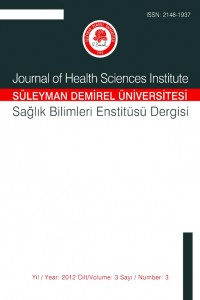Öz
The most common cause of fever is infections. In pneumonia patients having high fever despite empirical antibiotic therapy, the most common cause of fever is inappropriate antibiotic prescription or postinfectious complications such as empyema. However, other possible causes such as neoplasia, connective tissue diseases can also be found simultaneously with pneumonia. In this case report, we want to emphasize the necessity of a careful physical examination in patients with pneumonia, especially in elderly patients, since they may have other pathologies which may cause fever.
Anahtar Kelimeler
Kaynakça
- Özlü T, Bülbül Y, Alataş F ve ark. Türk Toraks Derneği Erişkinlerde Toplumda Gelişen Pnömoni Tanı ve Tedavi Uzlaşı Raporu. Türk Toraks Dergisi 2009; 10 (Suppl.9): 1-16.
- Özlü T. Toplum kökenli tipik pnömoniler. Sendrom 1996; 8:41-46.
- Campbell GD. Overview of community-acquired pneumonia: prognosis and clinical features. Med Clin North Am 1994; 78:1035-1038.
- Arancibia F, Ewing S, Martinez JA, et al. Antimicrobial treatment failures in patients with community-acquired pneumonia. Causes and prognostic implications. Am J Respir Crit Care Dis 2000; 162:154–160.
- Lynch JP III, Tunay K. Nonresolving or slowly resolving pneumonia. Clin Chest Med 1999; 20:623–652
- Fein A, Feinsilver SH, Niederman MS. Nonresolving and slowly resolving pneumonia. Diagnosis and management in the elderly patient. Clin Chest Med 1993; 14:555–569.
- Genné D, Sommer R, Kaiser L, et al. Analysis of factors that contribute to treatment failure in patients with community-acquired pneumonia. Eur J Clin Microbiol Infect Dis. 2006; 25:159–166.
- Petersdorf RG, Beeson PB. Fever of unexplained origin: Report on 100 cases. Medicine 1961; 1:1- 30.
- De Kleijn EM, Vandenbroucke JP, Van Der Meer JW. Fever of unknown origin. A prospective multicenter study of 167 patients with fever of unknown origin, using fixed epidemiologic entry criteria. The Netherlands FUO Study Group. Medicine (Baltimore) 1997; 76:392-400.
- Tabak F, Mert A, Çelik AD, et al. Fever of unknown origin in Turkey. Infection 2003; 31:417-20.10.
- Santos JW, Torres A, Michel GT, et al. Non- infectious and unusual infectious mimics of community-acquired pneumonia. Respir Med. 2004; 98:488-494.
- Olivieri I, Palazzi C, Peruz G, et al. Management issues with elderly-onset rheumatoid arthritis: an update. Drugs Aging 2005; 22:809-822.
- Bajocchi G, La Corte R, Locaputo A, et al. Elderly onset rheumatoid arthritis: clinical aspects. Clin Exp Rheumatol. 2000; 20:49-50.
- McCarty DJ, O’Duffy JD, Pearson L, et al. Remitting seronegative symmetrical synovitis with pitting edema. RS3PE syndrome. JAMA 1985; 254:2763-2767.
Öz
Enfeksiyonlar, ateş yüksekliğinin en sık sebebidir. Ampirik antibiyotik tedavisine rağmen ateş yüksekliğinin devam ettiği pnömonili olgularda, en sık ateş nedeni uygunsuz antibiyotik seçimi veya ampiyem gibi postinfeksiyöz komplikasyonlardır. Ancak bu hastalarda, neoplaziler, kollajen doku hastalıkları gibi başka olası nedenler de eşzamanlı bulunabilmektedir. Biz bu olgu sunumuyla, özellikle ileri yaştaki hastalarda, pnömoninin yanı sıra ateş yüksekliğine neden olabilecek başka patolojilerin de var olabileceğini, bu açıdan hastaların fizik muayenelerinin dikkatle yapılması gerektiğini vurgulamayı amaçladık.
Anahtar Kelimeler
Kaynakça
- Özlü T, Bülbül Y, Alataş F ve ark. Türk Toraks Derneği Erişkinlerde Toplumda Gelişen Pnömoni Tanı ve Tedavi Uzlaşı Raporu. Türk Toraks Dergisi 2009; 10 (Suppl.9): 1-16.
- Özlü T. Toplum kökenli tipik pnömoniler. Sendrom 1996; 8:41-46.
- Campbell GD. Overview of community-acquired pneumonia: prognosis and clinical features. Med Clin North Am 1994; 78:1035-1038.
- Arancibia F, Ewing S, Martinez JA, et al. Antimicrobial treatment failures in patients with community-acquired pneumonia. Causes and prognostic implications. Am J Respir Crit Care Dis 2000; 162:154–160.
- Lynch JP III, Tunay K. Nonresolving or slowly resolving pneumonia. Clin Chest Med 1999; 20:623–652
- Fein A, Feinsilver SH, Niederman MS. Nonresolving and slowly resolving pneumonia. Diagnosis and management in the elderly patient. Clin Chest Med 1993; 14:555–569.
- Genné D, Sommer R, Kaiser L, et al. Analysis of factors that contribute to treatment failure in patients with community-acquired pneumonia. Eur J Clin Microbiol Infect Dis. 2006; 25:159–166.
- Petersdorf RG, Beeson PB. Fever of unexplained origin: Report on 100 cases. Medicine 1961; 1:1- 30.
- De Kleijn EM, Vandenbroucke JP, Van Der Meer JW. Fever of unknown origin. A prospective multicenter study of 167 patients with fever of unknown origin, using fixed epidemiologic entry criteria. The Netherlands FUO Study Group. Medicine (Baltimore) 1997; 76:392-400.
- Tabak F, Mert A, Çelik AD, et al. Fever of unknown origin in Turkey. Infection 2003; 31:417-20.10.
- Santos JW, Torres A, Michel GT, et al. Non- infectious and unusual infectious mimics of community-acquired pneumonia. Respir Med. 2004; 98:488-494.
- Olivieri I, Palazzi C, Peruz G, et al. Management issues with elderly-onset rheumatoid arthritis: an update. Drugs Aging 2005; 22:809-822.
- Bajocchi G, La Corte R, Locaputo A, et al. Elderly onset rheumatoid arthritis: clinical aspects. Clin Exp Rheumatol. 2000; 20:49-50.
- McCarty DJ, O’Duffy JD, Pearson L, et al. Remitting seronegative symmetrical synovitis with pitting edema. RS3PE syndrome. JAMA 1985; 254:2763-2767.
Ayrıntılar
| Birincil Dil | İngilizce |
|---|---|
| Bölüm | Olgu Sunumları |
| Yazarlar | |
| Yayımlanma Tarihi | 6 Ocak 2013 |
| Gönderilme Tarihi | 9 Mayıs 2012 |
| Yayımlandığı Sayı | Yıl 2012 Cilt: 3 Sayı: 3 |


